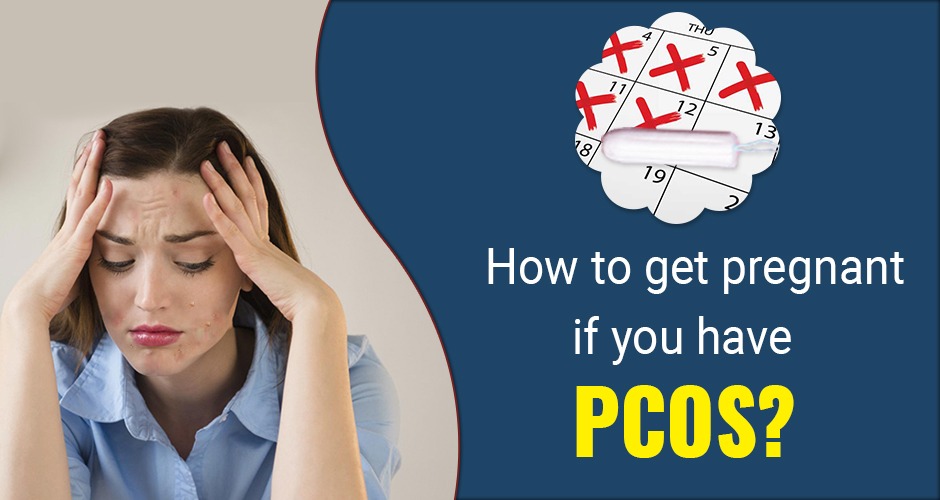
7 Tips For Getting Pregnant With Polycystic Ovary Syndrome
Polycystic Ovary Syndrome (PCOS) is a fairly common problem in women and is one of the top causes of female infertility. Essentially, it is a group of symptoms that affects ovaries and ovulation.
PCOS causes anovulation i.e. women affected by this condition do not ovulate or they ovulate irregularly or the ovulated eggs are of poor quality. Also, women affected with PCOS tend to have higher amounts of male hormone – androgen. However, most women with PCOS can conceive with a suitable combination of lifestyle changes and fertility treatments.
Also read: How Do Fibroids Affect Pregnancy And Fertility
Polycystic Ovary Syndrome and its effects
In PCOS, there are many small cysts in the ovaries more than 12-14 in each ovary. Due to which the eggs don’t mature properly and are not released. Also, PCOS can cause thin endometrial lining in the uterus, due to which even if a properly matured egg is released, the uterus may not support the implantation of the fertilized egg.
Apart from absence or irregular periods, PCOS can cause weight gain, insulin resistance and excess body hair in affected women.
Tips to conceive with Polycystic Ovary Syndrome
Though PCOS is known to the most common cause of female infertility, it can be treated successfully with some lifestyle changes and fertility treatments, if required.
Let us understand some tips for lifestyle changes that can help you in conceiving when affected with PCOS.
#1. Maintain a healthy BMI
A high BMI obviously points to obesity. If you are overweight, it is recommended to lose some weight as it increases the chance of ovulation and also gives greater chance of success if you undergo fertility treatment.
Also read: The Best And The Most Accurate Ovulation Calculator For Pregnancy
Women affected with PCOS tend to gain weight easily because it negatively affects the insulin processing in the body. However, losing at least 5-10% of your body weight can kick-start your ovulation and menstruation cycle.
#2. Start exercising regularly
PCOS, no doubt makes you feel tired and leaves you with low energy. However, starting a low impact exercise schedule is the best way to combat PCOS.
Exercising not only makes you feel energized and helps you to lose weight but also improves the hormone levels in the body to trigger ovulation.
#3. Adopt a balanced diet
Adopt a diet that is rich in complex carbohydrates, rich in good fats and less in sugar. Include an adequate amount of proteins and fibres in your diet. Avoid refined carbohydrates and refined sugar completely.
Ensure that you eat food with low glycemic load i.e. food which takes longer time to digest and hence, release sugar slowly into the bloodstream. This will help you in reducing insulin resistance.
#4. Include essential fatty acids
Your diet should include essential fatty acids such as Omega-3 which are required for hormonal functions in the body. These healthy fats increase chance of ovulation and ensure healthy hormonal levels in the body.
You can include flax seeds, fish or take cod-liver oil capsules. Also, you can regularly consume sesame seeds which is known to increase chances of ovulation and menstruation.
#5. Reduce stress levels
Stress is known to affect your hormones adversely and decrease your fertility levels. If you are stressed, try to reduce your stress levels. Opt for natural ways to combat stress such as meditation, breathing, and relaxation techniques.
Also read: Placenta: Development & Function During Pregnancy
#6. Multivitamin supplements
Take a prenatal vitamin or any supplement rich in Vitamin B Complex (B3, B6, B9 & B12) and Iron. These supplements increase the chances of getting pregnant and continue a healthy pregnancy. However, consult your doctor before you start on any supplements.
#7. Monitor Vitamin D levels
Get your Vitamin D levels checked and take supplements if necessary. Women with PCOS, generally tend to have lower levels of Vitamin D. This is an essential vitamin that boosts the chances of getting pregnant and also to carry on a healthy pregnancy. Polycystic Ovary Syndrome is a complex interplay of many factors such as hormonal imbalance, obesity, insulin resistance etc. If you have PCOS and trying to conceive, it is essential for you to make lifestyle changes even if you are undergoing fertility treatment. Simple lifestyle changes such as having a balanced diet and regular exercise, not only increases your fertility levels but benefits your health holistically in the long run.
Also read: Common Infections During Pregnancy And How To Avoid Them
PCOS is not a life-threatening condition and can be managed with suitable treatment and lifestyle changes. Though it affects your chances of getting pregnant, there is nothing that you should worry about if you are following a healthy lifestyle.
Want to share your mommy experience with other moms through words or images? Become a part of the Moms United community. Click here and we will get in touch with you
null
null